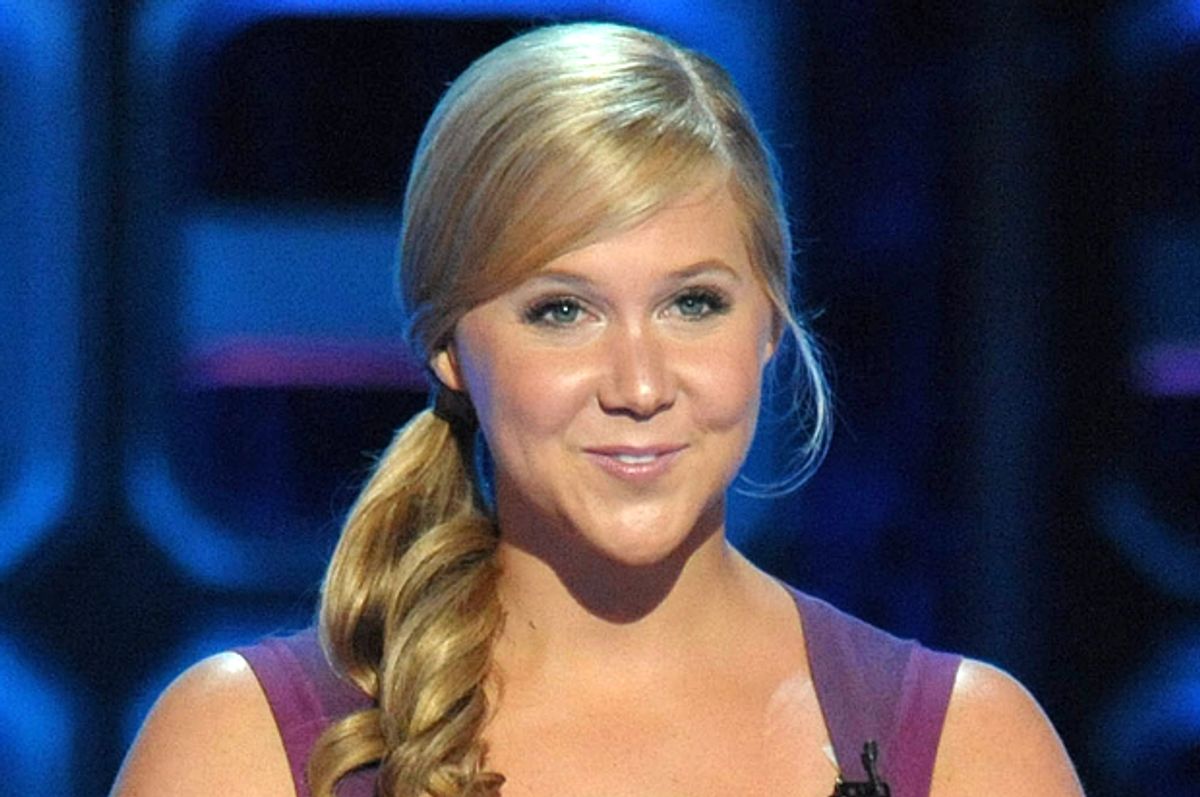Of course the Hollywood Reporter has to proclaim that its roundtable with six of Hollywood's "Emmy-contending comedy actresses" is going to be "raunchy." Of course the words "feminism" and "fearless" have to appear right in the introduction. That's how the conversation about women and comedy still, in 2015, has to go — with the rather astonished revelation that a woman who is successful and has strong opinions can somehow also be funny. And of course, should you choose to wallow into the comments on HR's chat with the formidable Lena Dunham, Amy Schumer, Ellie Kemper, Kate McKinnon, Gina Rodriguez and Tracee Ellis Ross, you'll find plenty of assessments of the women as "bar-hog-hookers" and "doughy-bodied... no talent, stupid hags" who are part of the evil feminist cabal of "extreme leftist, man hating, baby killing wh&res," as well as the observation that "I have never ever found any female comedian funny. They always come off as desperate and pathetic." And of course the conversation itself is goddamn righteous.
For those who still believe that male is the default and female is its own special class of human, perhaps the frankness with which the woman speak will come as a shock. When asked if there's anything they wouldn't do for a laugh, Schumer answers, "I would never suck a d__k for a laugh," Dunham replies, "I would never f— someone," and Golden Globe-winning "Jane the Virgin" star Rodriguez brings it home with, "I'm a brown girl, so I have to cross all the lines." The conversation then quickly turns to onscreen nudity and wardrobe issues, with Dunham admitting, "There's not one guy who works on that show who hasn't seen the inside of my vagina." Later, Schumer explains the lack of women in late night television with, "Because we get our periods at night." You know why? Because believe it or not, this is how lots of women talk. Beyond the dainty dream that when ladies get together they like to fill the conversation with, I don't know, pedicures, macarons and book club selections, the truth is that the life of a woman is often mired in discussion regarding the management of our bodily fluids, the vivid messiness of child-rearing and yes, information sharing about penis size. It's just that when men have their own versions of those conversations, it's just called conversation. When women do it, it's called "raunchy."
But the greater revelation of the HR roundtable isn't that a bunch of powerful female performers might talk about things like the awkwardness of sex scenes. It's their smart, insightful disclosures about the entertainment industry — and the culture of sexism and racism that we all still have to swim in. Dunham tells about a male worker who approached her on the set of her show and snarked, "You're really enjoying that buffet, aren't you?" and says of social media, "The way women are spoken to… is truly shocking. It's how you imagine people screaming at prisoners in Guantanamo." Schumer observes, "I think people hate women. I don't think they want to hear a woman talk for too long. A lot of people project their mom yelling at them. My [career] has been about tricking people into listening. I'm not saying all men hate women, but there's such an aggression." And when asked about "the biggest fight you've had about money" Kemper, the star of one of the most acclaimed new shows of the year, admits simply that "I'm not powerful enough to have that fight."
The past few months have seen a seismic shift in the way that women — and men — in the entertainment industry are addressing the long-held standards of toxicity as the norm. Melissa McCarthy recently pushed back at a critic who presumed that a female character exists as the pretty window dressing in the story, while 37 year-old Maggie Gyllenhaal told The Wrap that she'd been called "too old to play the lover of a man who was 55" — a situation that "made me me feel bad, and then it made me feel angry, and then it made me laugh." And in Cannes this week, Tom Hardy replied to a reporter who asked, regarding "Mad Max," "Did you ever think, why are all these women in here? I thought this was supposed to be a man's movie," with a blunt, "No. Not for one minute." Meanwhile, blockbusters like "Pitch Perfect 2" are proving that guess what? You can make a movie that passes the Bechdel test and people will pay to see it, almost as if entertainment involving females is like regular entertainment for humans.
The amount of fury directed at women for telling stories and making jokes and attaining success is truly outstanding. As Kemper says, "The vitriol, it's stunning." But the glory of that HR roundtable is that it's proof that women in Hollywood are going to keep on talking, and exposing BS and hypocrisy where they find it. "I want women to have all the things," says Dunham. And the glory is that, trolls be damned, they're getting them.

Shares